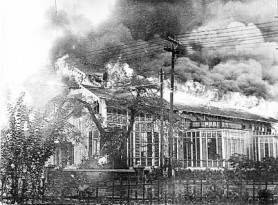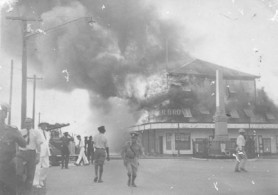Many of these buildings that Georgetown lost in the fire of February 23, 1945 had been erected during the last century and represented the best in Victorian Architecture.

The Victorian elements are, by a wide margin, superior in beauty and design to our present structures. Gone are the days when the crystal rays of chandeliers flickered against the walls, and beamed forth smilingly upon dark and shining floors. Years have rolled since the romantic art of carving which distinguished many of our buildings today has become obsolete and those buildings are cherished in appreciation of the epochs in which they were fashionable.
But today, the advent of science, every conceivable device being utilised to help or destroy man, many items give rise to industrialisation to a degree beyond all expectations. At our disposal now are many gases and minerals so dangerous that the slightest error may involve destruction to life and property. As a precautionary measure against another catastrophe of this nature, a new system of buildings would undoubtedly take the place of those now in ruins.
During the past 25 years, we have made quite a name for ourselves as a country of ambition. Commerce is the chief contributor to our appreciation. Many secondary business places have been opened and they have absorbed to our satisfaction a fair amount of unemployed. The participation of Government in the encouragement of local enterprises has contributed and is contributing greatly to the success of our economic developments.
Georgetown, although it has suffered miserably from the neglection of capital speculation, is looked upon with pride in the truest sense as a Caribbean metropolis of no mean distinction. Coming at a time when our post-war plans were being effected, the fire should be looked upon as something to be grateful for. By this statement I simply mean that, had it occurred at the practical realisation of our plans, it would then be looked upon as a shattering blow and would have cast a shadow of gloom over the entire country. Therefore, it would be well for us to look to the firms and to the people that have suffered directly from the effects with patriarchal reverence for our future progress.

The fire has taught us that there is a difference between the pioneering stage and the fully developed one. The pioneering stage of our commercial economy is passed and gone and it is now the enhancement of the latter stage that must be treated as of primary importance. The appearance of this phenomenon has clearly indicated the birth of new structures in which fears that one little fire-outbreak would lead to something of a catastrophic nature would be forced to lie dormant within us.
Let us now consider the erection of fire-resisting buildings. To my mind the most suitable material for such purpose is concrete. Georgetown is the hub of this country and has to shoulder the responsibility for the safety of three and one-half hundred thousand people. It is life-line of our existence and great energy and initiative are required in keeping it stimulated.
In raising arguments for better constructed buildings in the place of those obliterated by fire, it would be unwise to overlook the condition of many that are left standing. These must be completely reconditioned to conform with those that would be built out of the ruins. With the practical realisation of such a plan, feelings of pride would eventually surge through us and we would look upon Water Street much as the citizens of the USA look upon Wall Street.
No doubt, many would regard this as wishful thinking but, judging from the remarkable strides that we have made commercially in less than a decade, it would not be at all surprising in the next ten years should we find it difficult to distinguish sites that we see now.
We must look upon this fire as the initial step in the evolution of communal progress. It has brought to the fore the ecstasy of unity and co-operation that was in the past only a verbal expression. The sincerity and earnestness which were demonstrated by the commercial community in rendering practical aid to those who were directly affected by the disaster is a matter that could never be over-estimated.
Another factor of equal importance is the recognition by the employers of the invaluable assistance by their employees. This clearly indicates what magnanimous benefits can accrue from the hand-in-hand policy of these two parties upon whose shoulders rests the destiny of our country. The gallant display by our commercial men in taking the drubbing on their feet, with a profound desire to establish themselves once again, is something that should stimulate every true Guianese soul. It is a noble exhibition on the part of men who are not easily discouraged by frustration and, with this in view, we can have no fear regarding the future of our country.
Let us now turn our thoughts to social objectives. In the destruction of the Museum, we lost relics − over one hundred years old − ranging from animals of the wildest parts of our jungle, to those which accompany us along the coastlands; birds of every size and magnificence of Solomon arrayed in all his glory. Nevertheless, the loss of the Museum is not irreparable for in its place could be erected two buildings which would undoubtedly be more beneficial to the community and also command greater respect from the foreigner. These are a zoo and an art gallery.
In discussing the former item, nothing for its enhancement proves in any way difficult. Our Botanical Gardens comprise over 180 acres of which at least 4 acres could be made sufficiently useful, for such a project. With an eye on Government’s plan for hinterland development, we could rest assured that no chaos would present itself in the discovery of animals, reptiles, and birds suitable for a zoo.
To erect a zoo with all modern conveniences, to attract capital, would need a tidy amount which we must not underestimate. But my contention is that, given time, it would make back whatever has been spent on it. A reasonable fee within the majority’s pockets is sure to bring success, a success that will inevitably lead to more interested onlookers, more energy, and initiative in seeking for more exhibits which may even result in widening the boundaries of our project in a short space of time. It is my opinion that public services of this type tend to distinguish this country as one that is not only an outpost of British Empire, geographically, but flourishes under her banners in all the traditions and glory.
An art gallery is an essential long overdue. It is something more than a mere exhibition of various paintings and creations. It mirrors the character of a nation, community or individual. For instance, we distinguish a home by the pictures we see hanging in it. If these pictures are of characters who have, in some way or other, accomplished a task by which the human race has nobly benefitted; or of some beautiful part of the earth’s surface, we can infer that home is a living testimony of an orthodox life in which a thorough moral conception of elevated and intellectual examples can be acquired. With that fact in our minds, we now turn to the building of a new type of Guianese culture.
It would be well for us to embark upon the task of recreating from our history, characters and events that are seldom familiar to the tourist. By these he would be forced to realise and even to respect the ideals of a thriving community whose influence in world affairs in the near future may not be regarded as an overambitious project. Another is the fact that he would get to understand much of our country, in a shorter period than he would by poring over the contents of a manual.
Let us erase from our memories, the temporary inconvenience that this disaster has placed upon many of our people and look upon it as the beginning of a new era. Many of the unworthy sights to which we were accustomed have been obliterated and we must therefore hope that “history will not repeat itself” by allowing these grotesque scenes to dominate their former threshold.
We must get to the point: it has been openly admitted by many of England’s statesmen that the indiscriminate bombing of London must be looked upon as “a blessing in disguise.” The obliteration of the “slum areas” will give rise to better buildings and a better layout of that city. Let us therefore look upon this devastation as a foundation stone for the future of this country.
As I saw on that February afternoon the thick dull smoke fleeing in front of a steady south-westerly breeze, I wondered what fate had in store for us.
Then, sometime after as the fire was subdued, I saw the moon appear over a cloudless sky, then a white smoke like phosphorous formed a semi-circle around the devastated area and from within the rubble and debris a vivid illumination could be seen through the slowly rising smoke. The summits of the telegraph poles which the fire was stealthily eating away kindled into flames and the satellites of the moon lent harmony to this majestic panorama. I looked upon them as a symbol of our future achievements.
By ridding ourselves of our fears for the future and seeking in earnest that elusive quality of co-operation for the good of our country and ourselves, we should in every way be hastening our steps towards self-government.
In that fire, a youthful life was made a martyr and it is therefore on the youths of this country that the solution of the problem rests – “Whether he should feel justified by his death or that his life was lost in vain.”
Since the fire, many discussions have taken place in which ideas vary one from another, regarding effects on the future of British Guiana. One fact, however, is certain and that is, that by our initiative and energy in seeking progress a Georgetown better than before will emerge from these ruins.





